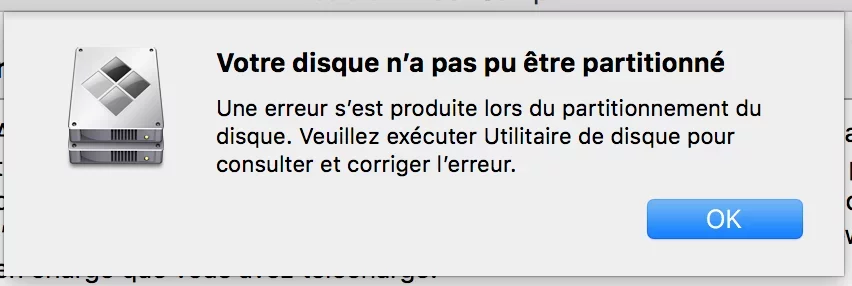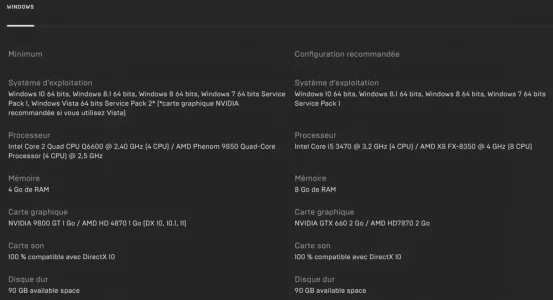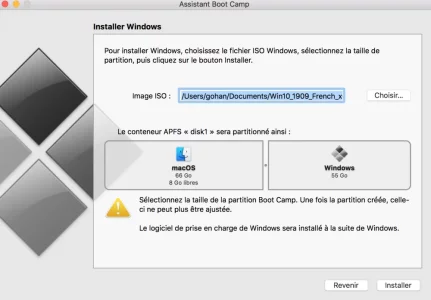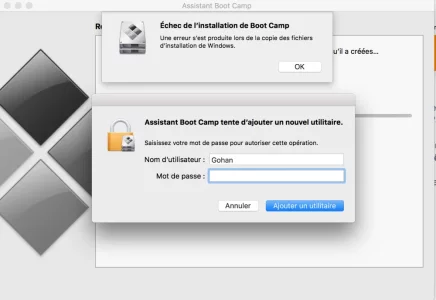Started file system verification on disk2
Verifying storage system
Using live mode
Performing fsck_apfs -n -x -l /dev/disk0s2
Checking the container superblock
Checking the fusion superblock
Checking the EFI jumpstart record
Checking the space manager
Checking the space manager free queue trees
Checking the object map
Checking the Fusion data structures
Checking volume
Checking the APFS volume superblock
The volume Macintosh HD - Données was formatted by diskmanagementd (945.250.134) and last modified by apfs_kext (1412.101.1)
Checking the object map
Checking the snapshot metadata tree
Checking the snapshot metadata
Checking the extent ref tree
Checking the fsroot tree
Checking volume
Checking the APFS volume superblock
The volume Preboot was formatted by asr (945.200.105.0.1) and last modified by apfs_kext (1412.101.1)
Checking the object map
Checking the snapshot metadata tree
Checking the snapshot metadata
Checking the extent ref tree
Checking the fsroot tree
Checking volume
Checking the APFS volume superblock
The volume Recovery was formatted by asr (945.200.105.0.1) and last modified by apfs_kext (1412.101.1)
Checking the object map
Checking the snapshot metadata tree
Checking the snapshot metadata
Checking the extent ref tree
Checking the fsroot tree
Checking volume
Checking the APFS volume superblock
The volume VM was formatted by apfs.util (945.250.134) and last modified by apfs_kext (1412.101.1)
Checking the object map
Checking the snapshot metadata tree
Checking the snapshot metadata
Checking the extent ref tree
Checking the fsroot tree
Checking volume
Checking the APFS volume superblock
The volume Macintosh HD was formatted by diskmanagementd (1412.41.1) and last modified by apfs_kext (1412.101.1)
Checking the object map
Checking the snapshot metadata tree
Checking the snapshot metadata
Checking the extent ref tree
Checking the fsroot tree
Verifying allocated space
warning: MT mapping (0x40000001b89ed -> 0x4a97fc, 1, C) is not completely referenced
warning: MT mapping (0x40000001cec9f -> 0x4c78ee, 4, C) is not completely referenced
warning: MT mapping (0x4000000231ed9 -> 0x28bca2, 236, C) is not completely referenced
warning: MT mapping (0x40000002406db -> 0x2b3180, 1, C) is not completely referenced
warning: MT mapping (0x40000002544da -> 0x4f82b0, 4, C) is not completely referenced
warning: MT mapping (0x40000002630bc -> 0x4f9fdd, 4, C) is not completely referenced
warning: MT mapping (0x400000026329f -> 0x4e954c, 4, C) is not completely referenced
warning: MT mapping (0x40000002632a3 -> 0x4e9554, 2, C) is not completely referenced
warning: MT mapping (0x40000002632a5 -> 0x4e9580, 2, C) is not completely referenced
warning: MT mapping (0x40000002632a7 -> 0x4e95a8, 2, C) is not completely referenced
warning: MT mapping (0x40000002632a9 -> 0x4e95c8, 2, C) is not completely referenced
warning: MT mapping (0x40000002632c7 -> 0x4e9640, 8, C) is not completely referenced
warning: MT mapping (0x40000002632d1 -> 0x4e9763, 2, C) is not completely referenced
warning: MT mapping (0x40000002632d3 -> 0x4e9773, 4, C) is not completely referenced
warning: MT mapping (0x40000002632d9 -> 0x4e9796, 2, C) is not completely referenced
warning: MT mapping (0x40000002632db -> 0x4e979e, 2, C) is not completely referenced
warning: MT mapping (0x40000002632dd -> 0x4e97a2, 6, C) is not completely referenced
warning: MT mapping (0x40000002632e3 -> 0x4e97aa, 2, C) is not completely referenced
warning: MT mapping (0x40000002632e7 -> 0x4e97b2, 2, C) is not completely referenced
warning: MT mapping (0x40000002632e9 -> 0x4e97b6, 2, C) is not completely referenced
warning: MT mapping (0x40000002632eb -> 0x4e97bc, 2, C) is not completely referenced
warning: MT mapping (0x40000002632ed -> 0x4e97c2, 2, C) is not completely referenced
warning: MT mapping (0x40000002632ef -> 0x4e97c6, 2, C) is not completely referenced
warning: MT mapping (0x4000000287dc9 -> 0x529157, 1, C) is not completely referenced
warning: MT mapping (0x4000000287e0e -> 0x52996b, 3, C) is not completely referenced
warning: MT mapping (0x40000002b81b5 -> 0x4c5eaf, 4, C) is not completely referenced
warning: MT mapping (0x40000002bfdc8 -> 0x4f432d, 1, C) is not completely referenced
warning: MT mapping (0x40000002c726f -> 0x118000, 1, C) is not completely referenced
warning: MT mapping (0x40000002db408 -> 0x19a0cf, 1, C) is not completely referenced
warning: MT mapping (0x400000035e792 -> 0x4c136a, 4, C) is not completely referenced
warning: MT mapping (0x40000003bfeaf -> 0x4d7502, 1, C) is not completely referenced
warning: MT mapping (0x40000004289a4 -> 0x4a8e20, 1, C) is not completely referenced
warning: MT mapping (0x40000004289b0 -> 0x4ac13f, 1, C) is not completely referenced
warning: MT mapping (0x40000004289bf -> 0x4ac150, 1, C) is not completely referenced
warning: MT mapping (0x40000004289c8 -> 0x4ac155, 1, C) is not completely referenced
warning: MT mapping (0x40000004289d7 -> 0x4ac191, 1, C) is not completely referenced
warning: MT mapping (0x40000004289f8 -> 0x4a8dc6, 1, C) is not completely referenced
warning: MT mapping (0x4000000428a06 -> 0x4abf3b, 1, C) is not completely referenced
warning: MT mapping (0x400000045592f -> 0x4f60de, 1, C) is not completely referenced
warning: MT mapping (0x4000000455930 -> 0x4f60e4, 1, C) is not completely referenced
warning: MT mapping (0x4000000455943 -> 0x4f651d, 1, C) is not completely referenced
warning: MT mapping (0x4000000455944 -> 0x4f6521, 1, C) is not completely referenced
warning: MT mapping (0x400000045597c -> 0x4f6592, 1, C) is not completely referenced
warning: MT mapping (0x400000045597d -> 0x4eac25, 2, C) is not completely referenced
warning: MT mapping (0x4000000455991 -> 0x4f65a5, 1, C) is not completely referenced
warning: MT mapping (0x4000000455992 -> 0x4eac33, 2, C) is not completely referenced
warning: MT mapping (0x40000004559df -> 0x4f660d, 1, C) is not completely referenced
warning: MT mapping (0x40000004559e0 -> 0x4eac88, 2, C) is not completely referenced
warning: MT mapping (0x40000004559f8 -> 0x4f66ba, 1, C) is not completely referenced
warning: MT mapping (0x40000004559f9 -> 0x4eac98, 2, C) is not completely referenced
Too many warnings of this type generated; suppressing subsequent ones
The volume /dev/disk0s2 appears to be OK
Storage system check exit code is 0
Finished file system verification on disk2






